Paying Tribute to Meyer Brownstone
Meyer Brownstone, an influential part of Oxfam Canada for the last five decades, died April 4th, 2019 at the age of 96. He was Chair Emeritus of Oxfam Canada. Meyer joined the fledging organization in 1967 and became the chair of Oxfam’s Ontario region. He soon became the chair of Oxfam Canada, and during his 17 years at the helm, helped to form the constitution of Oxfam International. Over that period, he stressed the need for the organization to go beyond its original charity status to recognize both development and the problem of “political poverty” as major steps towards achieving equality in the world. In 1986, he was awarded the Pearson Peace Medal, recognizing his work with Oxfam and his outstanding contribution to international understanding and cooperation.
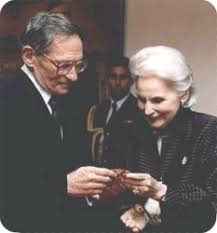
Meyer Brownstone being awarded the Pearson Peace Medal in 1986 by The Right Hon. Jeanne Sauvé, Governor General of Canada. Credit: United Nations Association of Canada.
As the Executive Director of Oxfam Canada, I visit many supporters, staff and volunteers. When I joined the organization, however, I was told that Meyer Brownstone was the Oxfam alumnus to speak with first. Even before that first meeting though, he had already sent me a tsunami of email commenting favourably or unfavourably on documents we had written or chastising me when he felt we were not vocal enough on different issues. Before replying to his emails, I would prepare by frantically researching whatever topic was on his mind. So I was a little nervous, to say the least, to meet him for the first time. While I wasn’t sure if he totally approved of me, that first meeting didn’t go too badly. Intimidated but impressed, I was happy he did suggest I come back some time.
Which I did - over and over again. Usually with a coffee and a treat and we would spend the morning or the day talking about issues; pouring through his old Oxfam pictures (he was the most amazing documentarian), while he regaled me with stories of all of his colourful moments at Oxfam Canada. He was legendary. He was so deeply committed to applying all of himself, his knowledge and expertise in the pursuit of ending global poverty, hunger and inequality.
One of his proudest Oxfam moments was to head a Canadian team that included Ed Broadbent, Iona Campagnola and Flora MacDonald in monitoring the South Africa election in 1994 when Nelson Mandela came to power. Meyer had the honour of being the only NGO observer to witness Mandela voting for the first time in his life and then to congratulate him on behalf of the Canadian people. He recounted the story with a kind of proud incredulity that it had happened to him. In a blog on his time at the polling station with Mandela, Meyer described how, after Mandela cast his vote, “I immediately congratulated him, and thanked him for his contribution on behalf of Oxfam Canada and the people of Canada and basked in the warmth of his beautiful smile.” Reflecting on this experience, he said, “the 1994 election and the exercising of Mr. Mandela’s vote celebrated Oxfam Canada’s historic position and work on the liberation of all peoples.”
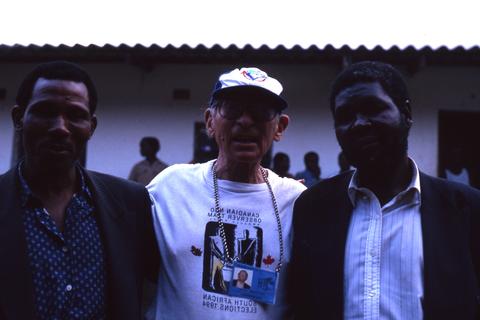
Brownstone with Inkatha Freedom Party leaders at a polling station, following agreement to participate in election, South Africa.
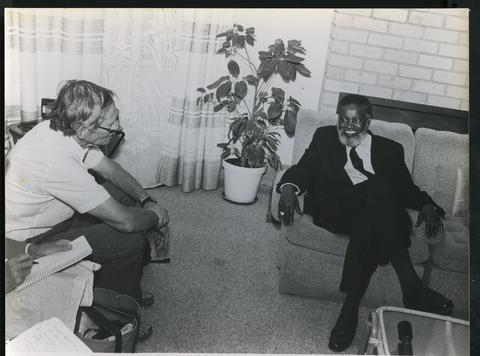
Brownstone and South West Africa People's Organisation (SWAPO) leader Sam Nujoma.
Meyer was also deeply involved in the conflicts in Central America in the 1970s and 1980s, and participated in several observer missions to the refugee camps in Honduras, documenting the life and struggles of refugees fleeing the Salvadoran Civil War. In 1985, he was head of a mission sponsored by Oxfam Canada and others to investigate reports of an assault by Honduran troops on Salvadoran refugees. He told me a story of pointing his camera at the troops one at a time as they surrounded the refugee camp. He felt that the camera, and the social action it represented, would always win out over guns and violence. It was particularly exciting that in these past few years, Meyer had the opportunity to use those photos from his visits to refugee camps to be part of On the Road to Virtue, a documentary film project on the refugee camps. This project emerged out of a visit to his local coffee shop, where the owner is Salvadoran and had stayed in one of the camps as a child. When Meyer showed him the photos, they both knew the importance, launching Meyer on an incredible project to document and share the photos through the film and through a photo exhibit in El Salvador.
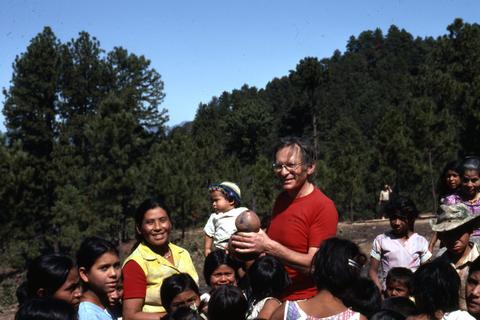
A gift to Meyer Brownstone, which he still had at his home, Colomancagua, Honduras, 1985.
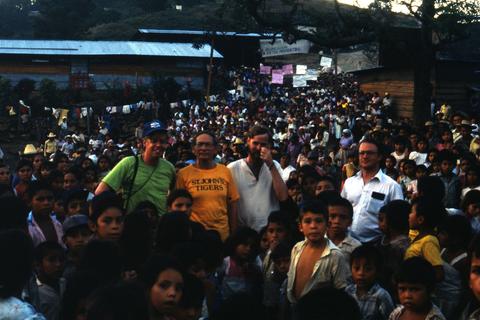
From left Cockburn, Brownstone, Barratt and House, Colomancagua, Honduras, 1985.
In an interview reflecting on his experiences with Oxfam, he remained optimistic about the world. “I’m very hopeful, because the things that I have witnessed, and which Oxfam has always supported, is the empowerment of civil society and classless movements. There are now thousands of those around the world, small but very effective in creating social and economic situations that are really transforming their societies on the basis of equality, particularly gender equality, and humanitarian values. Not through state action or state action alone, but civil society. That’s always been a focal point for Oxfam.”
It would be hard to list all of Meyer’s amazing accomplishments. A doctorate from Harvard University (though I only learned of this achievement after telling him I had been sick, and him insisting that I needed to come to visit Dr. Brownstone!); a professor with the University of Toronto and York University; a research supervisor for the Royal Commission on Bilingualism and Biculturalism; a cabinet advisor and deputy minister in Saskatchewan; a UN expert to review the local government system in Jamaica; a donor and advisor to an Oxfam Canada fund that supported innovative programs in Zimbabwe making connections between HIV/AIDS transmission, gender-based violence and the struggle for women’s rights and equality; a member of the Political Commission on Decentralization in Tanzania, working in the office of the then president Julius Nyerere, one of the most prominent African leaders at the time. This story was one of my favourites, because it helped shape his commitment to the struggles of the developing world and ultimately led him to his life long involvement with Oxfam Canada.
Meyer remained to the end a fervent supporter of Oxfam Canada and a staunch friend and advisor to me. A few weeks ago, we exchanged emails that started with a message from Meyer on International Women’s Day saying (in bold caps in an effort to yell his enthusiasm), “Happy International Women’s Day to my favourite international woman!!!” We then went on to plan our next date, to go to see a film at HotDocs in Toronto next month, considering the possible choices.
Meyer passed away in the loving presence of his family. Along with everyone who knew him, I am heartbroken to have lost both a legend and an amazing friend. But we know that Oxfam, and the world, is a better place because of Meyer Brownstone. We are indebted to his dedication to Oxfam Canada and to the Oxfam confederation, and will continue to be inspired by Meyer’s commitment to political struggles and social justice.
Some of Meyer's incredible photos of his time at Oxfam are available through the Archives and Research Collection at Carleton University.

